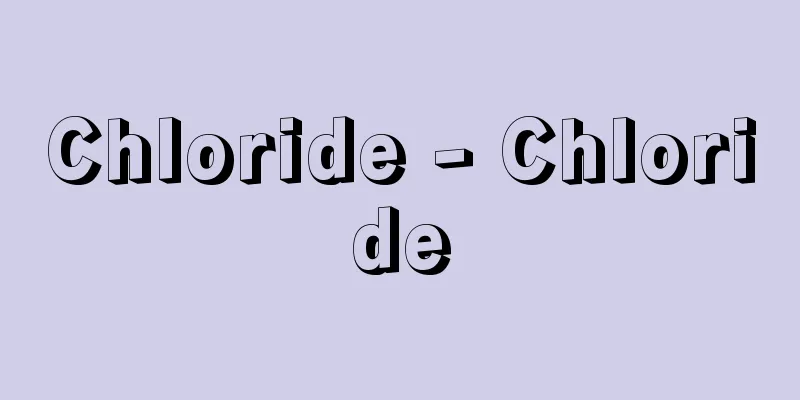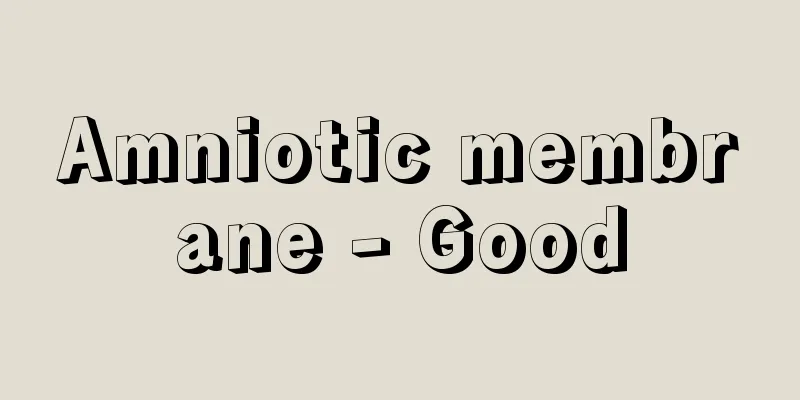Chloride - Chloride

|
A general term for compounds of chlorine with elements, groups, or polyatomic groups that are more electropositive than chlorine. For example, compounds of chlorine with metal elements include sodium chloride NaCl, calcium chloride CaCl 2 , aluminum chloride AlCl 3 , and titanium(IV) chloride TiCl 4 , while compounds of nonmetallic elements include hydrogen chloride HCl, sulfur dichloride SCl 2 , phosphorus trichloride PCl 3 , and carbon tetrachloride CCl 4 , all of which are expressed by the general formula ACl n ( n is a positive integer). Compounds of chlorine with various groups or groups include methyl chloride CH 3 Cl, dichloromethane CH 2 Cl 2 , and hexaamminecobalt(III) salt [Co(NH 3 ) 6 ]Cl 3 . Generally, metal chlorides are obtained by dissolving metal oxides, hydroxides, or carbonates in hydrochloric acid. They can also be obtained by reacting the element with chlorine, and many anhydrous chlorides of transition metals can only be obtained by direct reaction (e.g., chromium(III) chloride, CrCl 3 ). Chlorides of highly electropositive elements, such as alkali metals and alkaline earth metals (e.g., sodium chloride and calcium chloride), are often colorless ionic crystals that dissolve in water and produce neutral aqueous solutions. Chlorides of relatively weakly electropositive elements, such as transition elements (e.g., titanium(IV) chloride and chromium(III) chloride), have considerable covalent properties and are often composed of layered or molecular lattices. The hydrates of these chlorides are often aqua complexes. For example, aluminum chloride hexahydrate AlCl 3 ·6H 2 O is [Al(H 2 O) 6 ]Cl 3 , and nickel(II) chloride hexahydrate NiCl 2 ·6H 2 O is [NiCl 2 (H 2 O) 4 ]·2H 2 O. Chlorides of nonmetallic elements are obtained by direct reaction or by acid decomposition. They are often composed of covalently bonded molecules, are volatile, and are often gases or liquids at room temperature. They are insoluble in water or are hydrolyzed to produce hydrochloric acid and oxoacids of nonmetallic elements. For example, [Nakahara Katsunori] [Reference] | | | | | | | | | | | | | | |Source: Shogakukan Encyclopedia Nipponica About Encyclopedia Nipponica Information | Legend |
|
塩素と、塩素より陽性な元素または基、多原子団などとの化合物の総称。たとえば金属元素との間では、塩化ナトリウムNaCl、塩化カルシウムCaCl2、塩化アルミニウムAlCl3、塩化チタン(Ⅳ)TiCl4などのように、また非金属元素とは、塩化水素HCl、二塩化硫黄(いおう)SCl2、三塩化リンPCl3、四塩化炭素CCl4などのように、一般式ACln(nは正の整数)で表される。また各種の基や原子団では、たとえば、塩化メチルCH3Cl、ジクロロメタンCH2Cl2、ヘキサアンミンコバルト(Ⅲ)塩[Co(NH3)6]Cl3などがそうである。 一般に金属の塩化物は、金属酸化物、水酸化物、炭酸塩などを塩酸に溶かして得られる。また元素単体と塩素との反応によっても得られ、とくに遷移金属の塩化物の無水和物は直接反応によらなければ得られないものが多い(たとえば塩化クロム(Ⅲ)CrCl3など)。陽性の強い元素、たとえばアルカリ金属、アルカリ土類金属などの塩化物(たとえば塩化ナトリウムや塩化カルシウム)は、無色のイオン結晶が多く、水に溶けて水溶液は中性。遷移元素など陽性の比較的弱い元素の塩化物(たとえば塩化チタン(Ⅳ)や塩化クロム(Ⅲ))は、かなりの共有性を有し、層状格子あるいは分子格子からなるものが多い。またそれらの塩化物の水和物は、多くの場合アクア錯塩である。たとえば塩化アルミニウム六水和物AlCl3・6H2Oは[Al(H2O)6]Cl3、塩化ニッケル(Ⅱ)六水和物NiCl2・6H2Oは[NiCl2(H2O)4]・2H2Oである。 非金属元素の塩化物は直接反応させるか、酸分解によって得られ、多く共有結合性の分子からなり、揮発性であり、常温で気体ないし液体であることが多い。水には不溶、あるいは加水分解されて塩酸と非金属元素のオキソ酸を生ずる。たとえば [中原勝儼] [参照項目] | | | | | | | | | | | | | | |出典 小学館 日本大百科全書(ニッポニカ)日本大百科全書(ニッポニカ)について 情報 | 凡例 |
<<: Chloride cracking - Chloride cracking
>>: Chloroplatinic acid (English spelling)
Recommend
Kajimakura
The title of a jiuta koto song. One of the represe...
Za-yan (English spelling)
A form of classical Chinese poetry. A poem compose...
Acoustics
A field of study that studies the fundamentals an...
Mount Hoshu [Village] - Hoshuyama
A village in Asakura County, in the central-easter...
Loewy, RF (English spelling)
...It arose from the industrial design of America...
Warmth index
Months with a monthly average temperature of 5°C o...
Tunnel kiln - Tunnel kiln (English name)
A kiln for continuous firing of ceramics, refracto...
Female labor - Joseiroudou
It usually refers to women's employed labor (...
Tent - tent (English spelling)
Nowadays, the word tent is generally thought to r...
Ruse - Ruse (English spelling)
The capital of Ruse County in northern Bulgaria. ...
National Socialism
It refers to the ideology and movement that seeks...
Kuriharan - Kuriharan
An evergreen fern of the Polypodiaceae family. It...
Amasis - Amasis
... The Code of Manus states that if a person far...
Kubota Corporation - Kubota
A major industrial machinery manufacturer. In 1890...
Petrou; Letters of Peter
It is also called the Epistle of Peter. It belongs...









